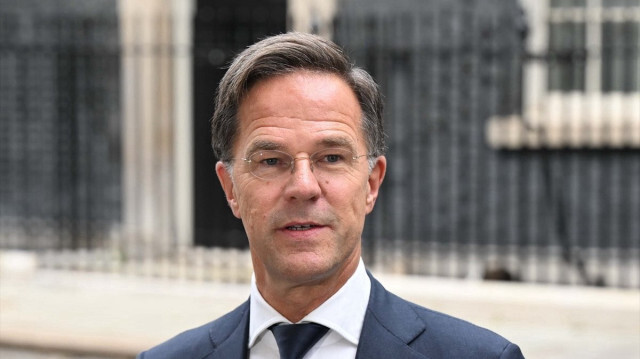
Alliance reaffirms its commitment to Ukraine, Balkans amid rising global threats from Russia and China
NATO's new chief on Wednesday announced military aid package for Ukraine over $40 billion, reaffirming the alliance's long-term commitment to bolstering Ukraine's defense against Russia's war.
Addressing NATO defense ministers, Secretary-General Mark Rutte stressed the urgent need to enhance defense industrial capacity and resilience across all domains.
He highlighted that while NATO has made significant progress in munitions production and the manufacturing of military equipment, the current output still falls short.
"We must scale up together to produce more and at lower costs," said Rutte, who took office earlier this month.
"We are working with urgency to deliver a financial pledge of at least €40 billion (nearly $43.5 billion) of military aid within a year to support Ukraine," he stressed, adding: "I can announce today that NATO allies committed €20.9 billion ($22.72 billion) in military assistance to Ukraine."
Rutte further emphasized NATO's commitment to ensuring Ukraine's long-term security and the readiness of its allies.
"We are not only defending a nation but also defending our shared values and the principle of sovereignty," he added.
He also said NATO's aid is not just military, but "a symbol of solidarity for Ukraine's right to self-determination."
He also hinted at further plans, saying: "The allies will soon discuss the next steps to strengthen our cooperation in key defense areas to continue standing by Ukraine as long as it takes."
- Western Balkans, Kosovo
In addition to Ukraine, Rutte raised concerns over rising tensions in the Western Balkans, particularly over Serbia and its neighbor Kosovo, whose sovereignty it does not recognize.
“The situation in the Western Balkans remains concerning, with secessionist threats in Bosnia and Herzegovina,” he warned, citing a “fragile security situation in Kosovo and little progress made in the EU-facilitated Belgrade-Pristina dialogue,” referring to Serbia and Kosovo.
“We must remain vigilant in our commitment to peace and stability in the Balkans,” he said.
He added: “The rise of secessionist sentiments presents a challenge that we cannot afford to ignore.”
“Our continued presence in Kosovo is essential for maintaining security and ensuring freedom of movement for all people,” he stressed.
He also said: “NATO's commitment to Kosovo Force (KFOR) remains strong, as we seek to support a stable and secure environment in Kosovo.”
- ‘Growing alignment' of China, Russia
“Russia is also seeking to undermine democracies in the region with cyber and hybrid threats, including disinformation ... using internal vulnerabilities to sow divisions,” he said.
Shifting to global alliances, Rutte cautioned against the growing alignment between authoritarian states such as Russia and China.
“The strengthening ties between Russia and China pose significant risks, not only to Europe but also to the Indo-Pacific region,” he said. “We must remain vigilant and united against this growing partnership.”
He stressed that this collaboration threatens stability across both the Euro-Atlantic and Indo-Pacific regions: “In this more interconnected world, it is vital that we tackle our shared security challenges together.”
Rutte highlighted the need for NATO allies to be aware of the growing cooperation between authoritarian regimes like Russia and China, emphasizing that such alliances could destabilize various global regions.
“As Russia and China deepen their collaboration, it is imperative that we reinforce our partnerships and commitment to democracy to counter any potential threats to our security,” he said.
“The interconnected nature of today's world means we cannot afford to ignore the implications of this alliance; our shared security is at stake,” he noted.
He concluded by reaffirming NATO's dedication to addressing shared security challenges with allied nations through increased cooperation in defense innovation and industrial production.
The two-day NATO defense ministers' meeting will conclude on Thursday at the alliance's headquarters in Brussels.
This will be the first meeting chaired by Rutte, who took office on Oct. 1.

